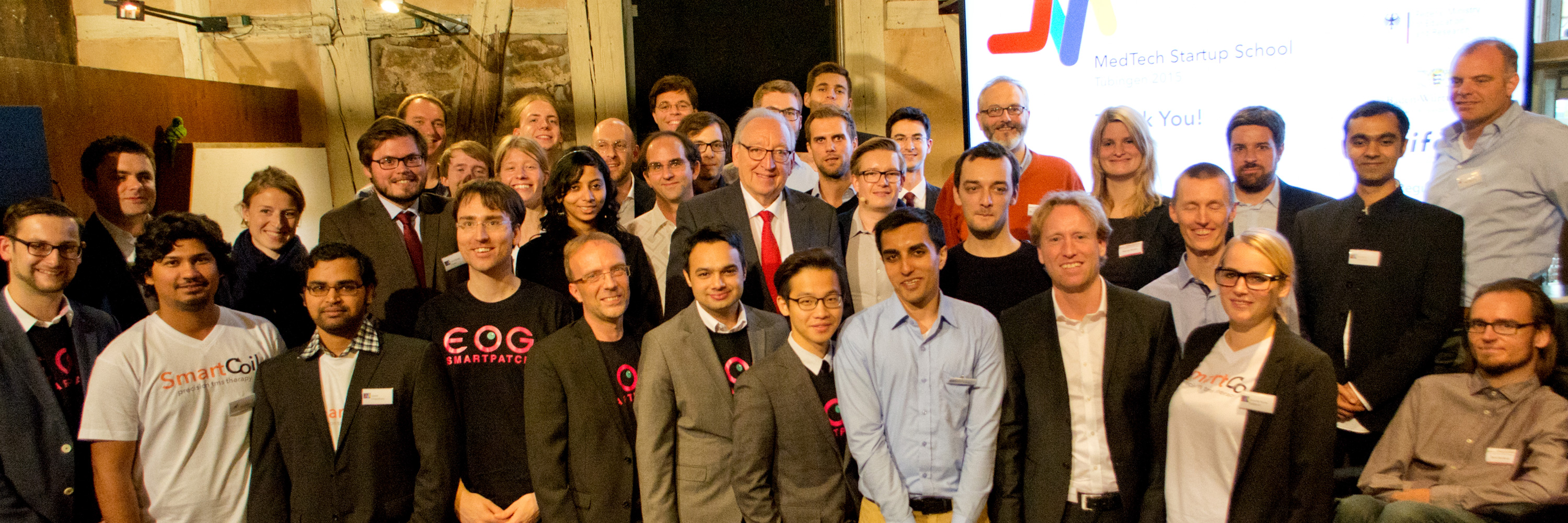The last 100 days have been extremely exciting. 16 teams have come a long way from having a rough idea to shaping it into a valid business model. Ten of the teams presented their amazing progress at Demo Day proving Tübingen’s high potential in the field of medical technology to visitors from industry, university and press.
The last Pitch of Summer
October 12th, 2015, Tübingen. Ten newborn startups are waiting in the wings. They are all about to have their very first pitch in public. Tension is rising. While they are busy with final preparations the ceremonial dining-hall of the restaurant Kelter fills with possible investors from industry, with business mentors, with people that could actually provide them with support for their desired product launches.
“We’re about to witness a messy birth” states Wong Meng Weng from JFDI. He travelled all the way from Singapore to see the outcome of the first startup accelerator in Tübingen. An accelerator such as the MedTech Startup School speeds up the progress of an individual startup and therefore the development of the entire innovation system. This is what happened during the last 100 days. As part of the process ideas were changed over and over again, teams split up and rebuilt, business models were worked over, markets and customers were lost and found. Ten out of 16 teams finally managed to present their startups in front of the curious audience. Lack of sleep, high pulse, stage fright – but in the end each team delivered a great performance.
With the MedTech Startup School a bit of Silicon Valley arrived in Tübingen. Oliver Hanisch, one of the keynote speakers, has been living in Silicon Valley for ten years. His advice to the startups of Tübingen: “Think big!” The teams should not only take over the American attitude of winning but also their culture of failing. Nine out of ten startups are going to fail. That’s what statistics say. So failure is alright – as long as you learn from it.
Another inspirational talk was held by professor Zrenner. When he founded his company Retina Implant twelve years ago there was no such thing as an accelerator. He had to figure out how to bridge the gap between having an idea, hurdling obstacles at university and building the right product himself. Suddenly his company was advertised all over Time Square – an experience he wishes the teams to have as well. That is why he formed the Medical Innovations Foundation last year. The MedTech Startup School was the first to profit from it.
Prof. Dr. Peter Grathwohl, the prorector for research at the University of Tübingen, is enthusiastic about the program as well. He praised the close cooperation between university, medical doctors from the University Hospital Tübingen (UKT), industrial partners like BioRegio Stern and business mentors such as Daniel Bartel, professor Nils Hoegsdal, Dirk Lehmann and Dinah Murad, and last but not least the young inventors that researched and worked with so much dedication.
By the end of the day each team had the chance to talk to possible investors from industry and to start building their network. Finally, a great after-party relieved everyone of tension and put a worthy exclamation mark on a successful experiment.













